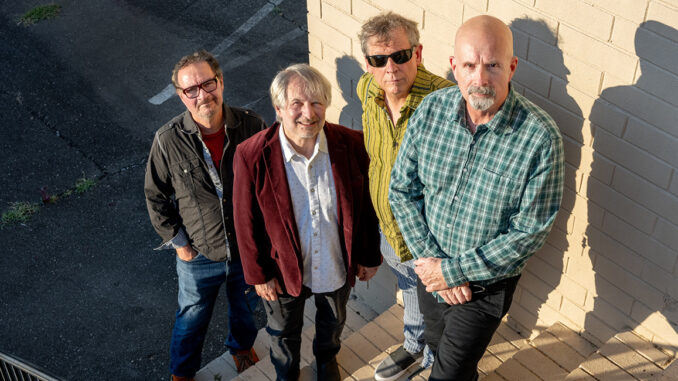
The dB’s are a New York City band — that’s the first and last thing Peter Holsapple will tell you. While he, Chris Stamey, drummer Will Rigby and bassist Gene Holder do hail from Winston-Salem, the definitive sound of The dB’s coalesced in NYC. But Winston is where influences began to shape what later became one of the state’s and country’s most iconic figures in alternative music.
“We were in a city with a very strong musical presence, particularly in the late ’60s and early ’70s,” Holsapple recalls. “On Saturday mornings, hundreds of kids would be dropped off at the Old Carolina Theater with a $5 bill in their pockets for hours to watch a movie, play bingo and maybe win a six-pack of Coca-Cola and see a local rock band. And that was my Saturday morning for years, which was remarkable.”
In 1970, childhood friends Holsapple and Stamey formed Rittenhouse Square, which happened to include another Winston-Salemite, Mitch Easter, who would later produce R.E.M.’s “Chronic Town” and “Murmur” and front Let’s Active, another influential band to arise from the Piedmont in the late ’80s. In 1972, Rittenhouse Square released an independent album recorded at Crescent City Sound Studios in Greensboro. After Rittenhouse Square’s dissolution, Holsapple and Rigby, friends since third grade, formed Little Diesel, a proto-punk rock band that ran against the tastes of Southern rock. “N.C.’s first punk band,” said Holsapple.
New York came calling in the late ’70s. Stamey had arrived on the scene playing with Alex Chilton’s Big Star, and drummer Will Rigby and bassist Gene Holder followed shortly after.
“We were really into New York and the New Wave scene. I was ready to go, and once I got there, I wasn’t going anywhere.” Rigby said.
The genesis of The dB’s began to jell, and Holsapple, living in Memphis, was invited to “audition” as keyboardist.
“I got a call from Will saying that they wanted me to come up and audition on keyboards. So I came up and auditioned on keyboards, and that was it. Well, I guess I was in the band. And there you go,” he laughed.
In 1981, The dB’s — now fully formed — released their debut studio album, “Stands for deciBels,” which shook the musical landscape and earned the quartet critical acclaim as power pop pioneers. Pitchfork Magazine cited the record among its 100 Top Albums of the 1980s. AllMusic applauded “a reverence for British pop and arty post-punk leanings … rarely is experimentation so enjoyable and irresistibly catchy” and said The dB’s were “the band that bridged the gap between classic ’70s power pop … and the jangly new wave of smart pop personified by R.E.M.” In The Village Voice’s year-end Pazz & Jop poll, “Stands for deciBels” was voted by critics as the 26th-best album of 1981.
R.E.M. bassist Mike Mills calls his first listen to The dB’s’ “Stands for deciBels” a defining moment in his — and his band’s — genesis: “This is the one that let me know we weren’t alone, that there were others out there with the same curiosity, the same willingness to dive into melody, structure and pop sensibility with no fear, no reserve, only joy and well-deserved excitement. I still love listening to ‘Stands for deciBels,’ and I always will,” he said.
Following the critical success of “Stands for deciBels,” The dB’s creative output continued through the 1980s with three follow-up records: “Repercussion,” “Like This” and “The Sound of Music,” and 1994’s “Paris Avenue.” In 2012, they released “Falling off the Sky,” with Rigby, Holsapple, Stamey and Holder working on various creative musical projects to fill the gaps between reunions.
In June, Chapel Hill’s Propeller Sound Recordings reissued “Stands for deciBels” on CD, and for the first time, it was released on vinyl in the United States. The dB’s are kicking off a short tour to celebrate the re-release at Hopscotch Music Festival in Raleigh on Sept. 7, followed by shows throughout the Southeast, Midwest and California.
“I hope that they hear what we’re playing and they like what they hear,” Holsapple said of playing to a new, younger audience. “I hope they understand the melodies, the harmonies, the chords, the drum patterns and the bass lines. It’s high-quality music for anyone of any age.”
